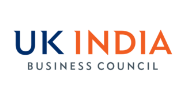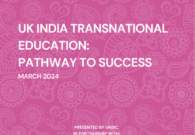Webinar: Marginal Becomes Mainstream – How Assessments are Embracing Technology in 2020 and Beyond
On 3 February, the UK India Business Council (UKIBC) conducted a webinar titled ‘Marginal Becomes Mainstream – How Assessments are Embracing Technology in 2021 and Beyond’.
UKIBC Associate Director Tara Panjwani moderated the session led by Graham Hudson, Special Adviser to Assessment Professionals Internationally – a long-standing member of the educational assessment community – and Nikhil Sharma, Business Development Manager, TCS iON at Tata Consultancy Services.
Quoting figures from a recent UNESCO report on COVID-19, Graham began the session by highlighting the staggering impact of the pandemic on the education sector worldwide. On 2 April, 172 countries closed their schools, leaving 1,485 million learners affected (84.8% of the world’s total enrolled learners). Graham looked further into the impact on specific countries including the UK, India, the United States of America, and Australia. In India for example, more than 300 million students were cut off as schools, colleges and universities closed their doors and examination boards postponed their assessments.
Caught unawares, many education institutions were simply not ready for this sudden and unprecedented turn of events and struggled to shift to digital platforms for delivering learning and assessment. Professional and credential organisations moved quickly to put their assessments online and fared better than most HE institutions who were not able to move so fast. Some however, were able to quickly adapt and innovate for the sake of their students.
It is some of these successful case studies of how the assessment sector coped that Graham went on to share to demonstrate best practices that had delivered good results. For example, the National Examination Board for Occupational Safety and Health (NEBOSH) adapted to this unprecedented situation by moving to an open book exam giving each learner 24 hours to complete their tasks followed by a 15 minute interview with the examiner to ensure validation. Their first revised exam was held in October 2020. This was a great example of an awarding body and a regulator working together, demonstrating quick thinking and agility in transitioning to their new environment.
The response from parts of the Higher Education sector has also been positive. Graham shared innovative steps taken by the University of London and the University of Newcastle in response to COVID-19. University of London for example, already had distance learning material in place and also offered support for teaching and assessing online. University of Newcastle for their part, are forerunners in this regard because they have been actively focusing on integrating technology into the educational experience since all the way back in 2006. University of Glasgow I should add, also showed great presence of mind and agility in transitioning all their lectures and learning materials online within the first few months of the lockdown. Graham encouraged the investment of virtual classrooms by universities since it ensures greater engagement with learners all over the world and allows for both remote and in-class participation. Graham also noted a few worthwhile national learning resources and suppliers in India.
Looking ahead, the JISC 2020 Report on the Future of Assessments is worth a read. The report gives five principles for the implementation of technology enhanced assessments – authentic, accessible, appropriately automated, continuous, and secure.
The urgent need was to reimagine how digital assessments should work now and into the future and allay students’ fears about their educational future. This is where TCS stepped in. Technology innovation already being their USP, they decided to use their capabilities in revolutionising assessments and accordingly launched TCS iON.
Nikhil spoke about the good work of TCS iON in leveraging automation to digitise assessment and learning. Their unique solution comprises of providing a secure digital platform which enables the delivery of end-to-end remote assessment services powered by Artificial Intelligence (AI).
To explain further, TCS iON uses AI for many aspects of assessments including authentication, de-duplication, remote proctoring, and test scoring. Nikhil then further highlighted the key capabilities and advantages of remote proctored assessments to demonstrate how sophisticated this technology was. These capabilities include:
- Verification
- Proctoring
- Object detection
- Posture detection
- Liveliness and spoofing check
- Droop detection
- Audio behavioural analysis
- Multiple voice recognition
- Invigilator tracking
Using these capabilities, the TCS iON Remote Proctored Assessment was introduced. The three modes in this assessment are self-proctoring, machine proctoring, and dual proctoring (human invigilation).
Till date, more than 230 million assessments (including high stake ones) have been conducted using this platform and more than 20,000 proctors deployed as part of the examination process.
In short, the TCS iON solution is a holistic one offering the platform, the services, the infrastructure as well as the people required. It has been a real gamechanger successfully enabling the delivery of remote assessments at home for large scale examinations in a trusted way.
Nikhil presented a case study involving a successful recruitment examination and ended his remarks on a positive note saying that ‘Today in India, every family is connected with us.’
Many thanks to our brilliant speakers for providing their time and resources for this webinar. If you were unable to join our session on the day, or would like to go through the webcast again, we invite you to watch the webinar below for the discussion in full.

 By Kealan Finnegan
By Kealan Finnegan 





